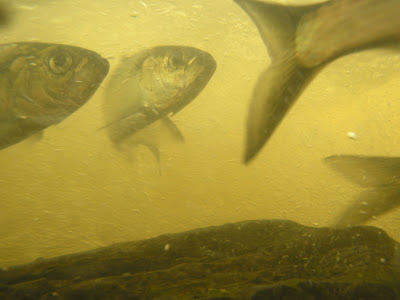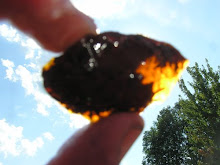
This is a photo by Tim Watts of blueback herring (Alosa aestivalis) at Ticonic Falls on the Kennebec River. In Penobscot, an alewife or blueback herring fishing place is called Mattamiscontis, in the Kennebec dialect it is called Amasacontee, and in the Wampanoag dialect it is called Namaskitt.
I met Kerry Hardy in March of 2007. He rode his bicycle 50 miles from his house in Rockport, Maine to the state capitol in Augusta, Maine to testify at a fish passage legislation hearing that was cancelled by the Marine Resources Committee of the Maine Legislature before we had a chance to speak.
While Ed Friedman, Kathleen McGee and I were waiting outside in the hall cooling our heels, they introduced me to Kerry. I learned he was an avid student of the Penobscot and Abenaki Indian languages, had in his head the vast geography of Abenaki place names in Maine and like me had memorized most of Fannie Hardy Eckstorm's seminal works which preserve the native place names of the Penobscot River valley and adjacent areas.
Talking to Kerry made me feel like I had found a long lost kin. He now has a book on this important subject coming out in June, published by Down East Press.
Last week, Kerry Hardy gave the following testimony to the Natural Resources Committee of the Maine Legislature:
---
Dear Natural Resource Committee members,
I'm writing to ask you to amend LD 330 to include the lower Androscoggin River, all the way to Merrymeeting Bay, in the proposed upgrade from Class C to Class B water quality.
I have attended numerous public hearings and work sessions in the past several years trying, mostly in vain, to spur legislative action that would help Maine's anadromous fish populations. Here, for the most part, is what I've seen:
1) Executive branch malfeasance tainting the entire legislative process.
By "executive branch" I'm indicting everyone from the companies that currently own this branch of our government, to the Governor himself, to the Commissioners more willing to serve him than the resources they supposedly guard, to the smooth-talking "under-Commissioners," who know that if they can deliver the desired legislative results to the Governor, they too will be a Commissioner of Something, someday. With this in mind, they willingly corrupt the work of legislative committees by stalling, misleading, confusing, and even outright lying to them.
2) Legislative branch abdication of its constitutional duty.
Our legislators are given too many bills to process, too little time to do it, and almost no pay in exchange for their time. Legislators face constant pressure from the executive branch to conform to its agenda, and a steady stream of misinformation to help bring this about.Sadly, it's working; the executive branch has effectively neutered the legislature in this state, thereby removing one of the two checks on runaway executive branch power. That leaves only the judicial branch in the way-- and we know who gets to appoint judges.
3) Judicial branch becoming the only meaningful arena for environmental action.
No less a Mainer than George Mitchell said, "It's a sad day when you have to sue the EPA to make it do its job." Just substitute "MDEP", "MDIF&W", or "MDMR" for the "EPA" in this quote, and you pretty much summarize the state of environtmental affairs in Maine. These days, the only significant gains are occurring in courts.
I bet you already knew this. Moreover, I'm not trying to make anyone feel ashamed as a legislator. As far as I can tell, most legislators and most environmentalists are quite alike: they do what they do as an act of conscience, and certainly not because there's any money in it! By contrast, the executive branch and all its hangers-on, including the lobbyists who are always in your ear, are paid very well to do what they do, and have a way of keeping their jobs for years and years; while legislators are just underpaid part-timers who come and go, and who get to take the heat back home when "Augusta" does something stupid.
This depressing state of affairs isn't going to change overnight. However, at least some parts of it are easily remedied-- by realizing that the resource agencies in Maine today are little more than political flunkies; by asking hard questions when they come before you; by requiring direct answers and actions from them; by checking their facts often enough to keep them honest; and by balancing their testimony against that offered by conservation-minded citizens or groups. When Andy Fisk tells you what the Governor wants you to hear, he earns his day's pay; when I travel to Augusta to testify, it costs me a day's pay-- consider our respective motivations, and how these might affect our testimony!
Most importantly, by voting your conscience-- regardless of all the helpful coaching from the Blaine House and its many arms-- you can start restoring balance to our state government.
In all of the various legislative sessions I've attended, never once have I heard a state official say to a Committee, "This is something we legally have to do; it's required by the Clean Water Act." Quite the contrary, our resource agency personnel do all they can to support the prevailing legislative belief that compliance with this Federal law is somehow optional. It isn't!-- and when our legislators fail to realize this, they only set the stage for more court battles that the State will lose. The law is clear enough, and for a legislature to disregard it-- whether through active lawmaking, or much more commonly through passive inaction-- is a colossal waste of time and resources.
Maine's repeated failures, in all three branches of government, to comply with national environmental law is the main reason why the Federal Government has had to intervene on behalf of species like Atlantic salmon and river herring. If we continue this dismal performance, we hasten towards a future where many more such decisions will be federally imposed. As legislators, you cannot keep your heads in the sand with regard to the Clean Water Act-- it's real; it's not going to go away, even if the Governor wishes it would.
Please use your vote to address these issues, by amending LD 330 to include the lower Androscoggin River.
Thank you,
Kerry Hardy
Rockland, Maine










No comments:
Post a Comment